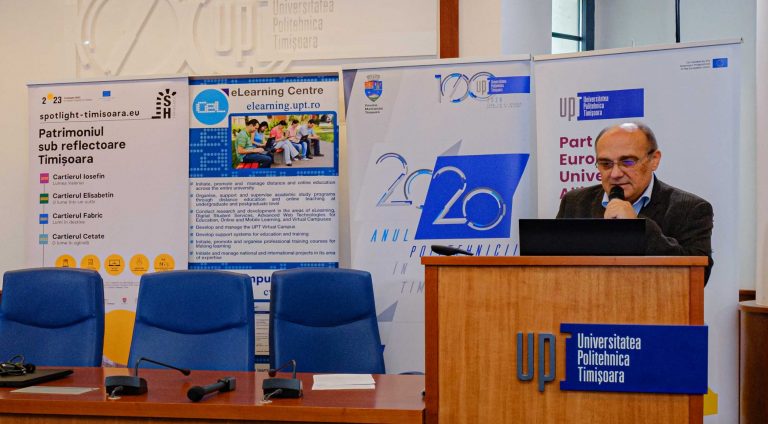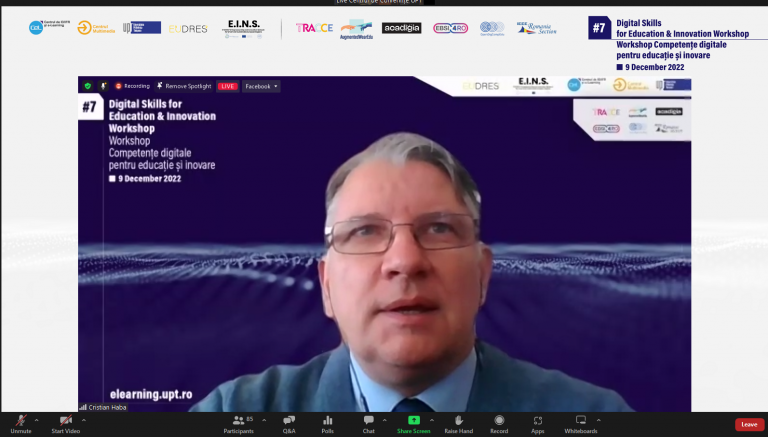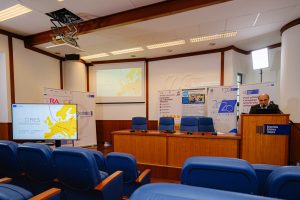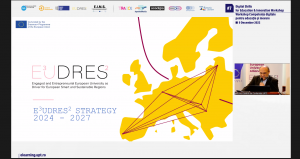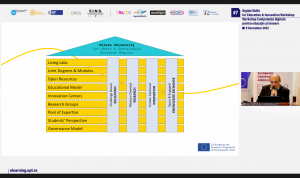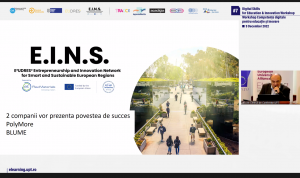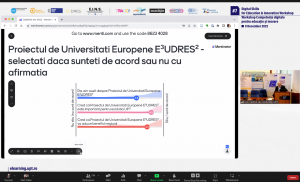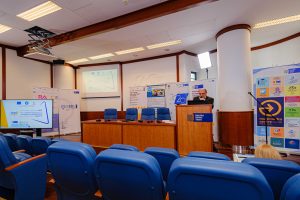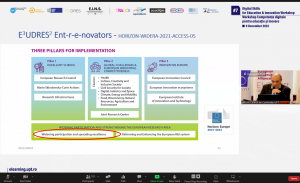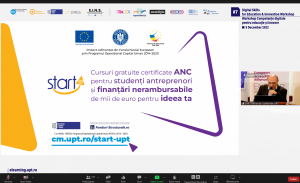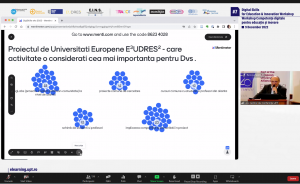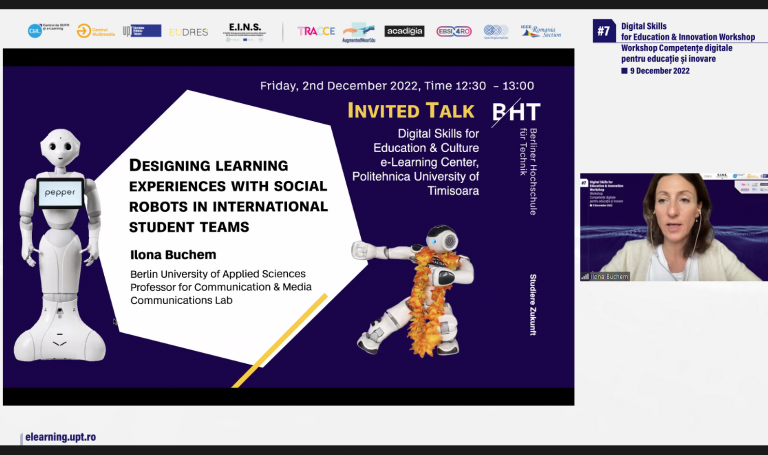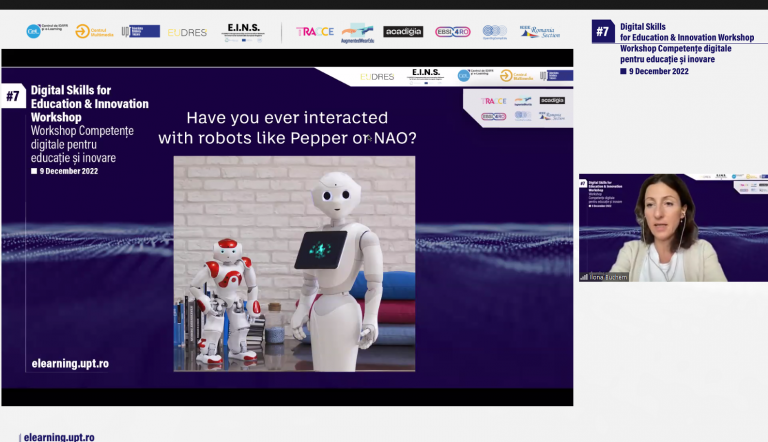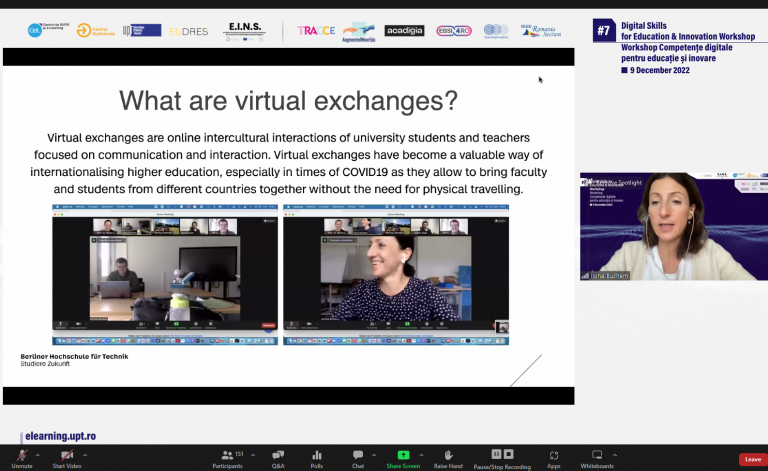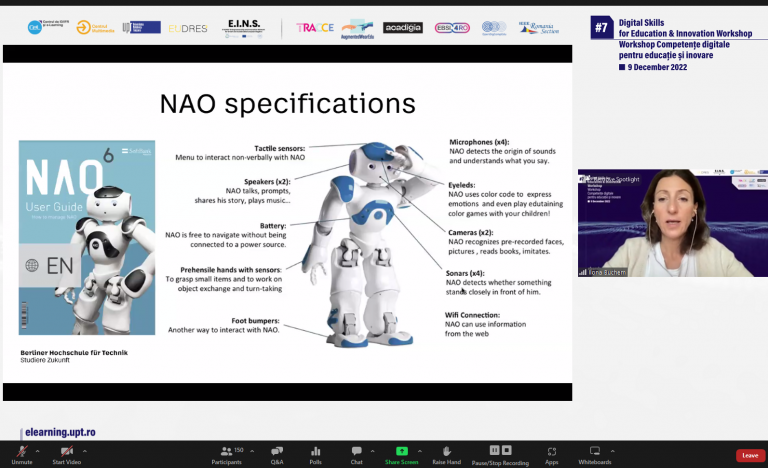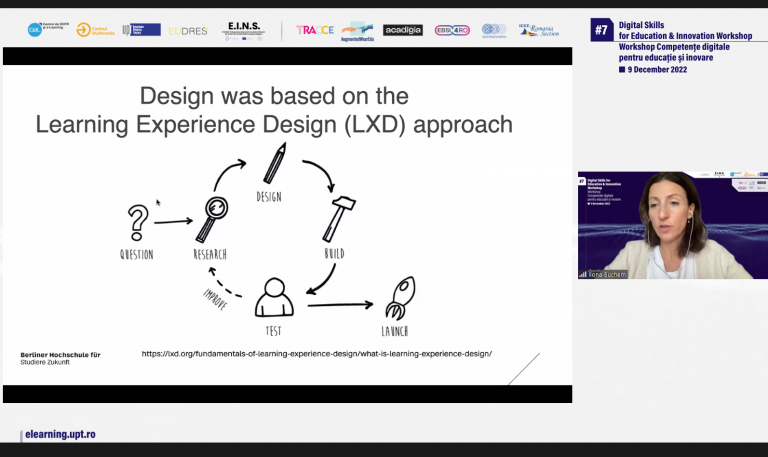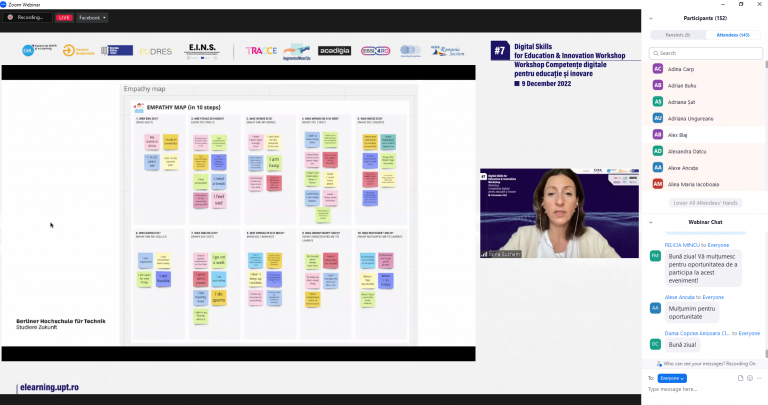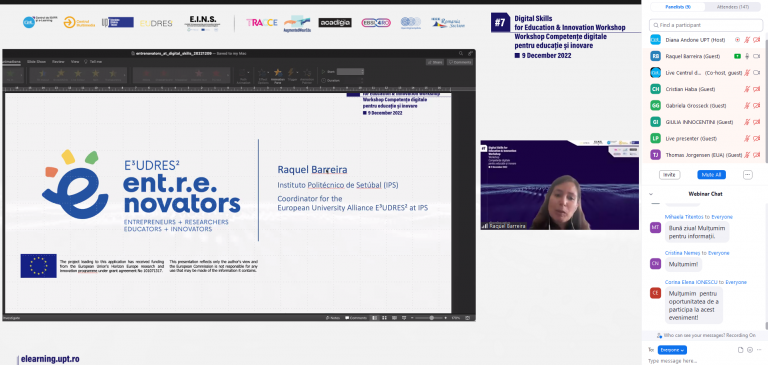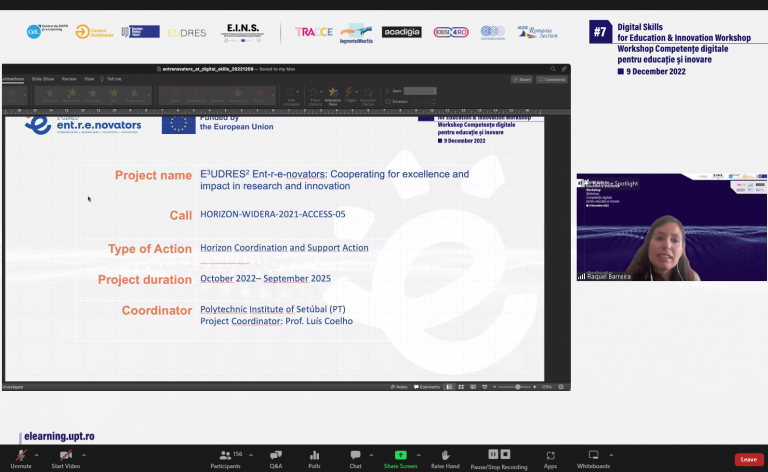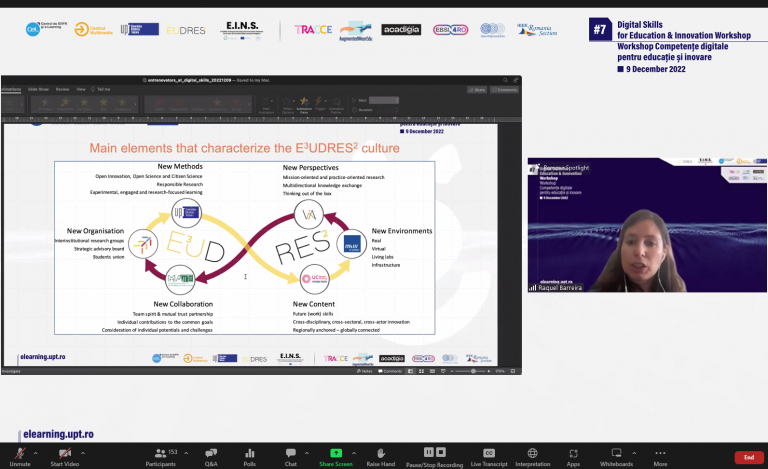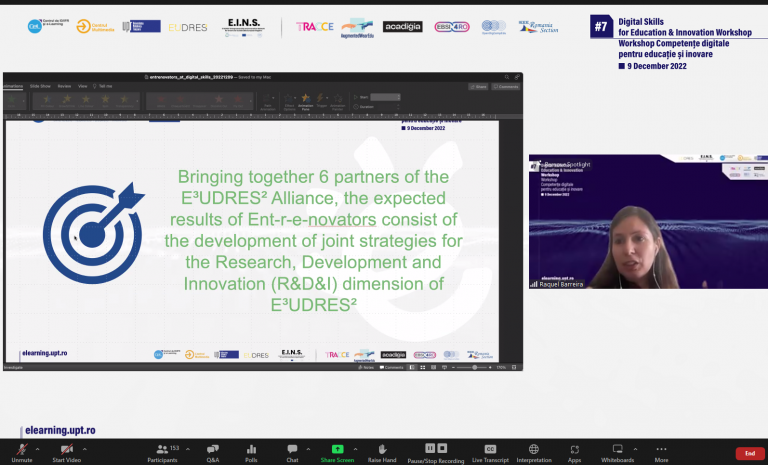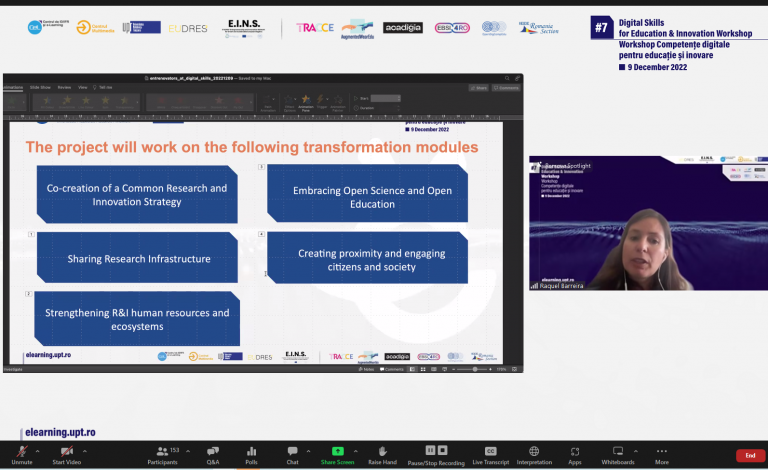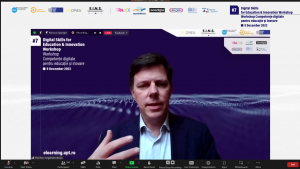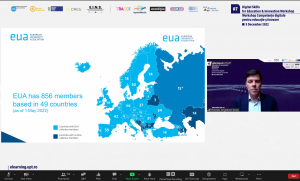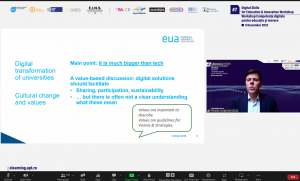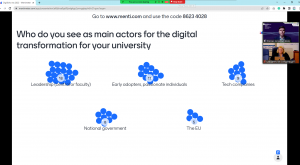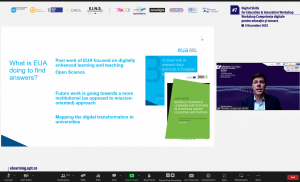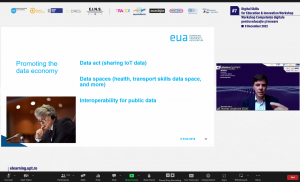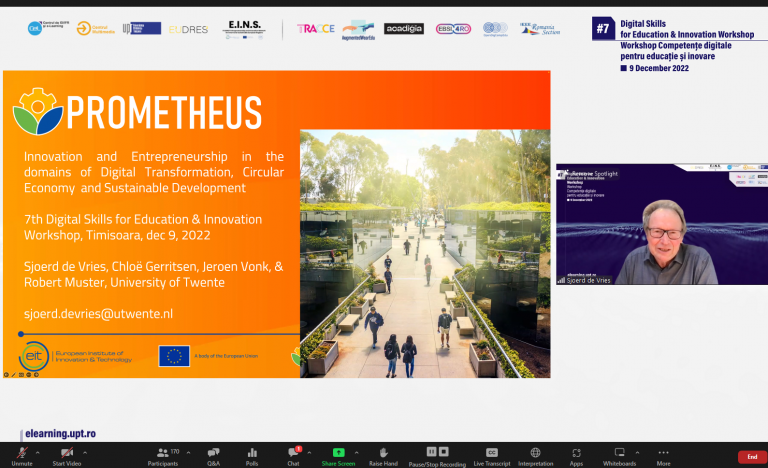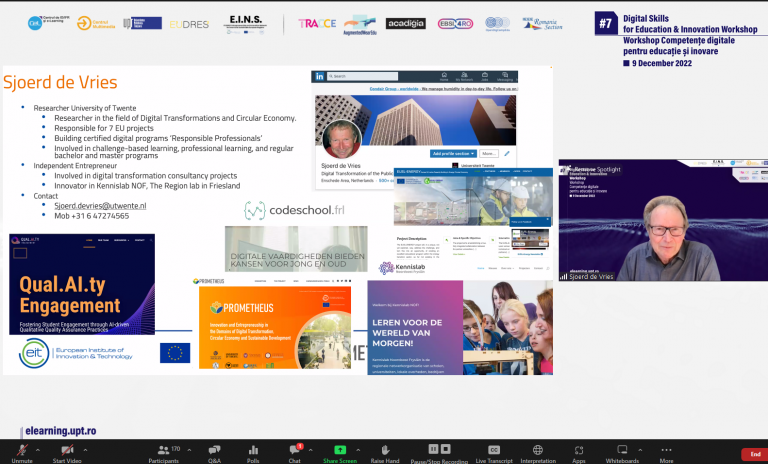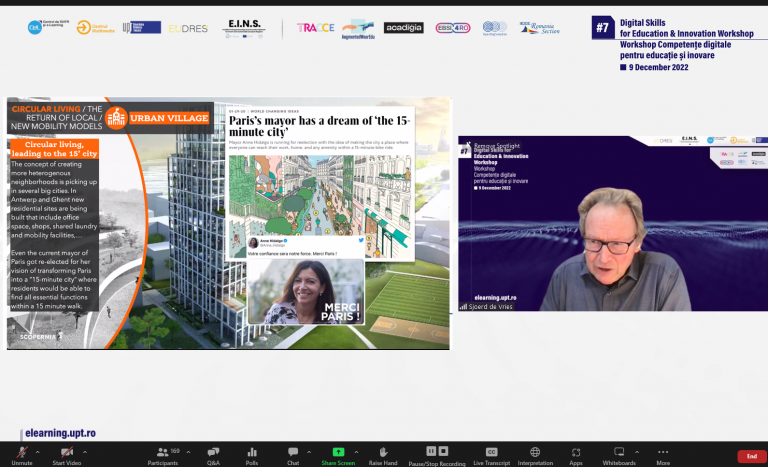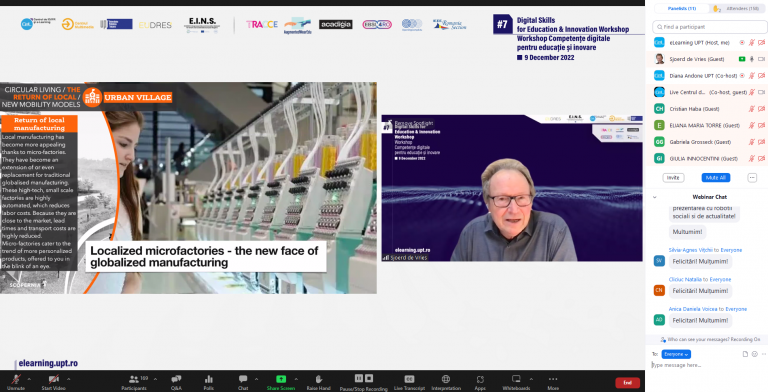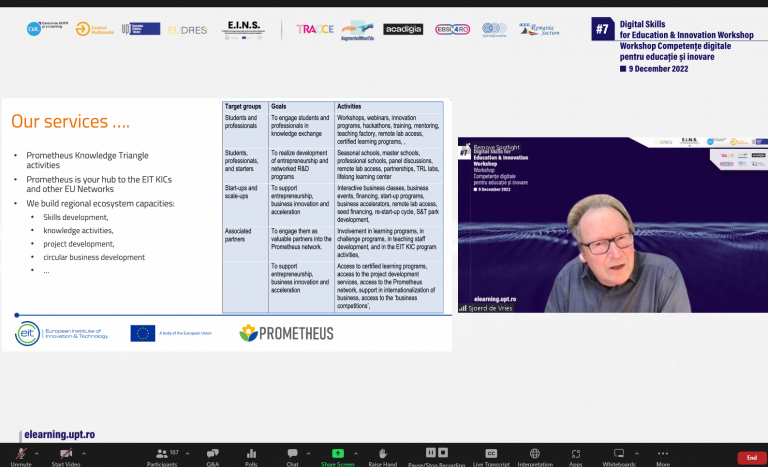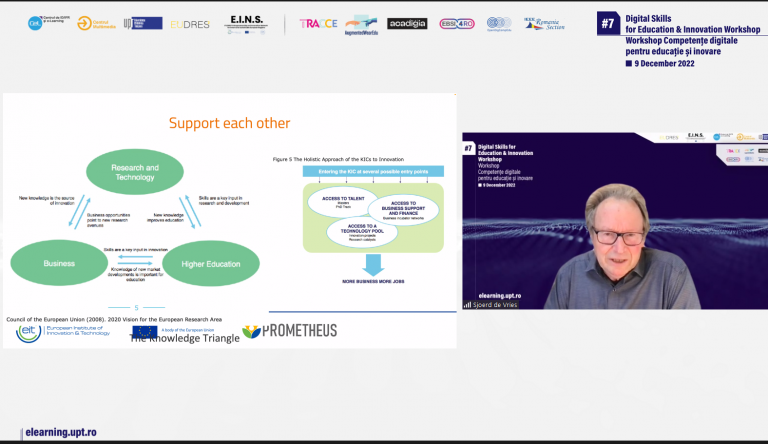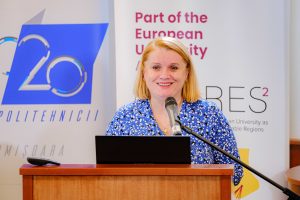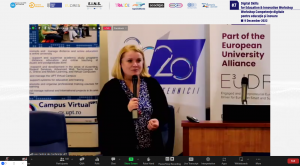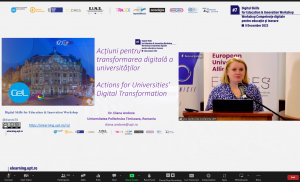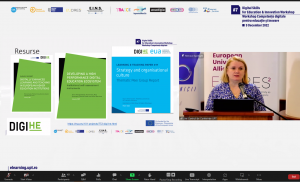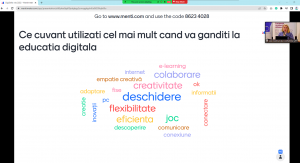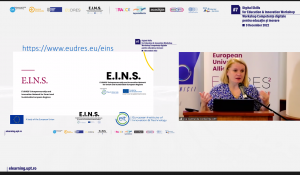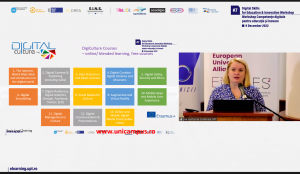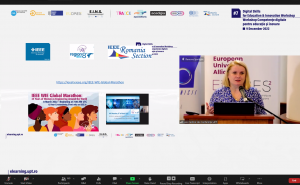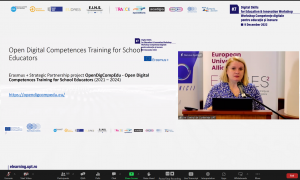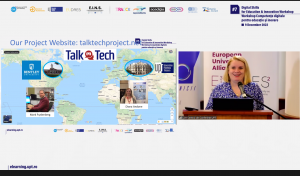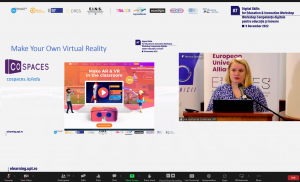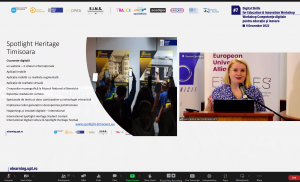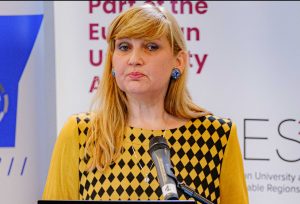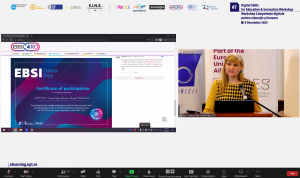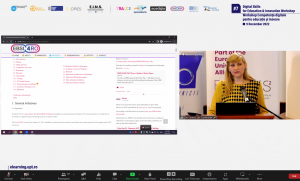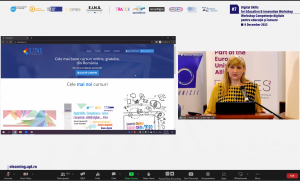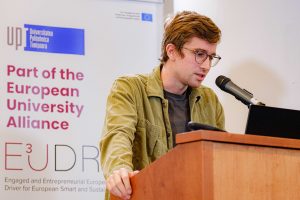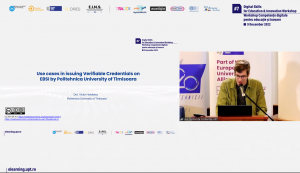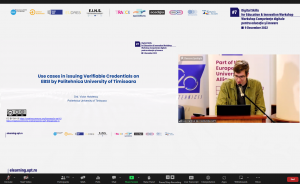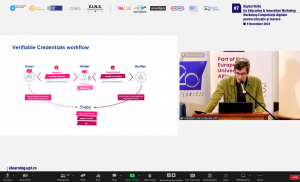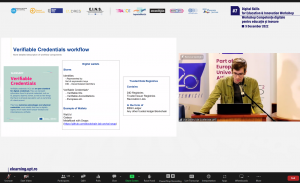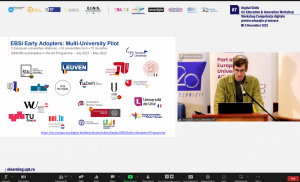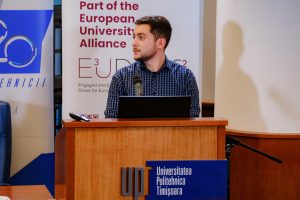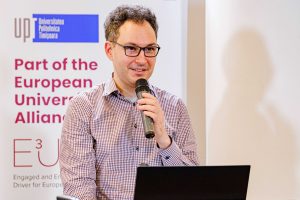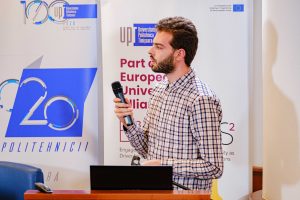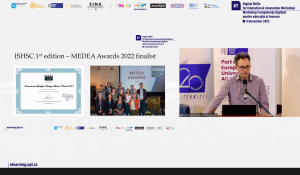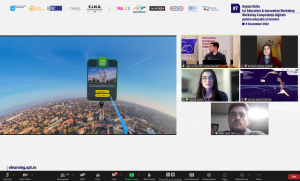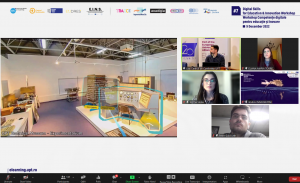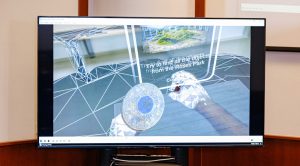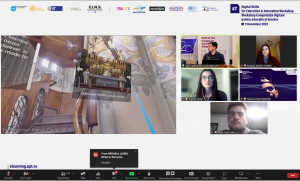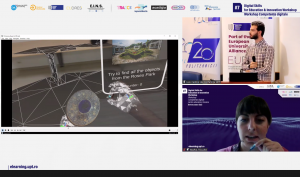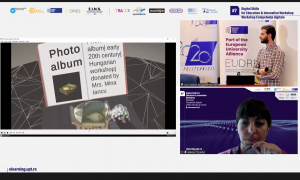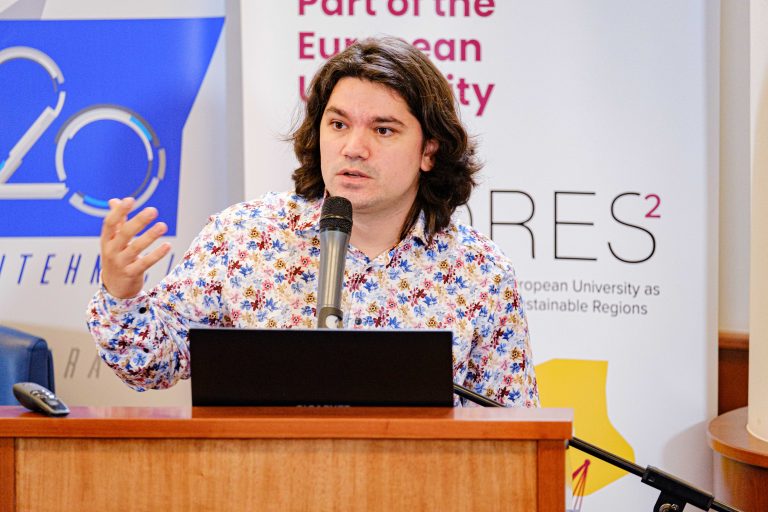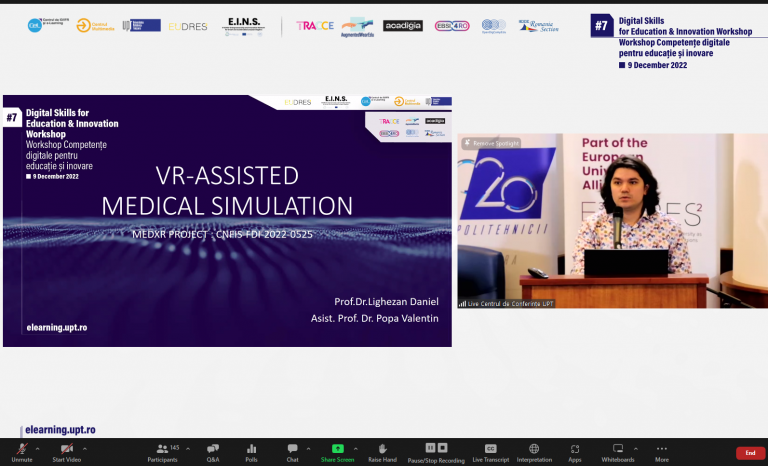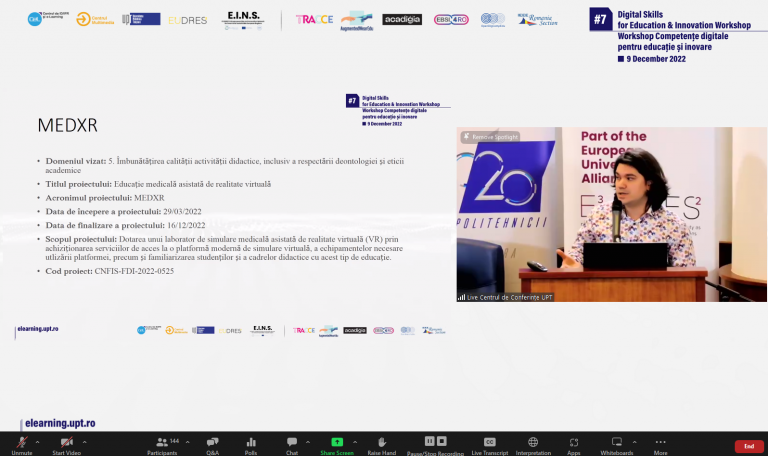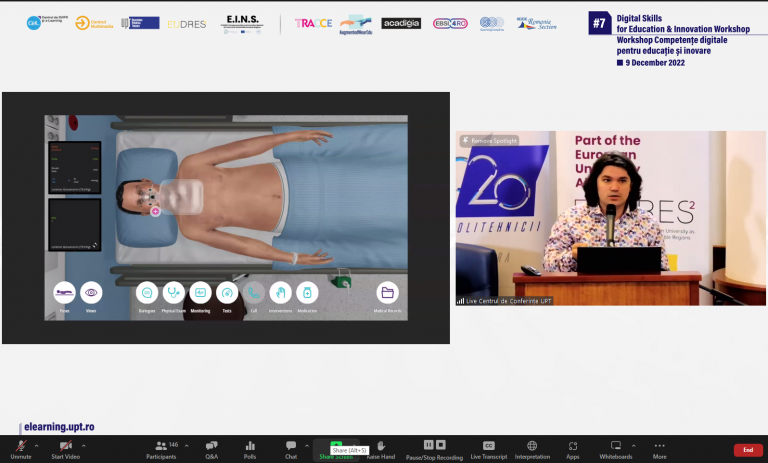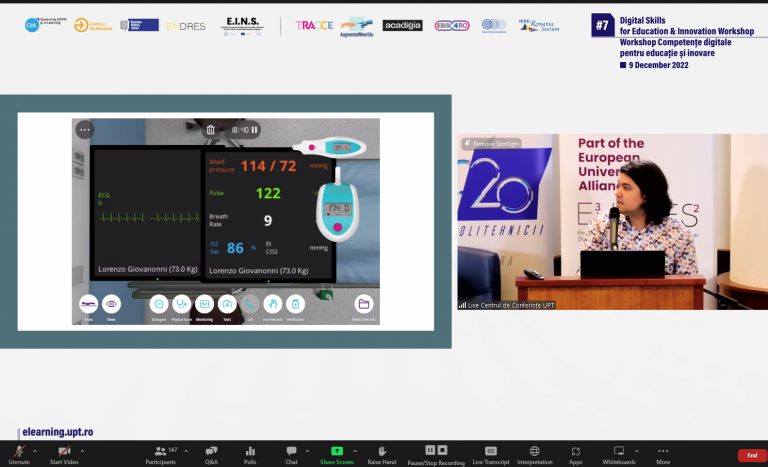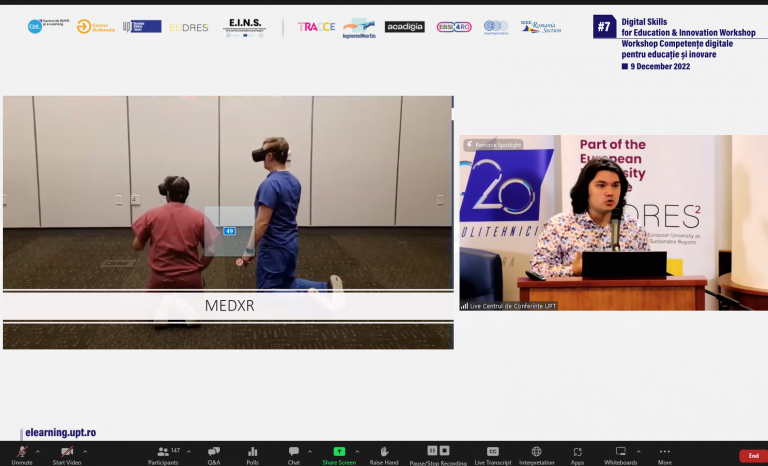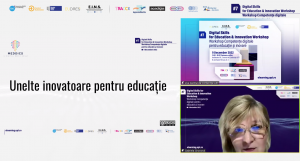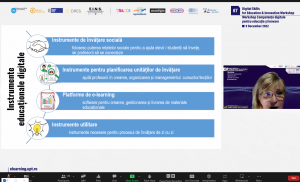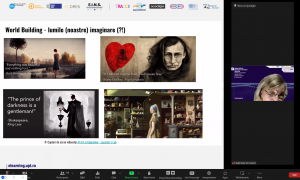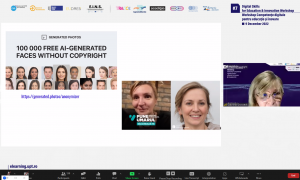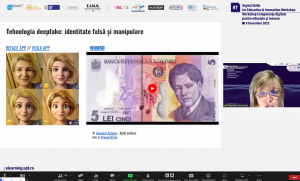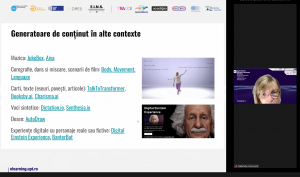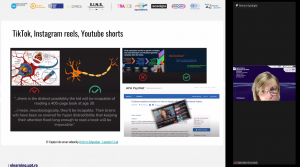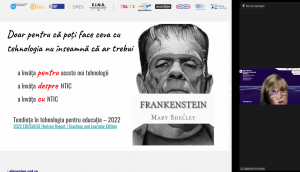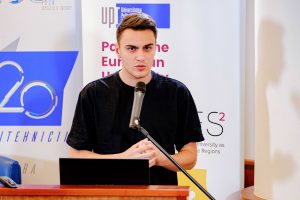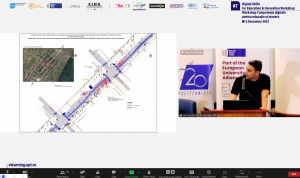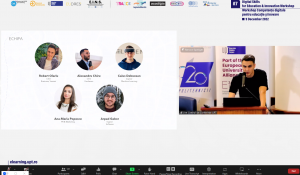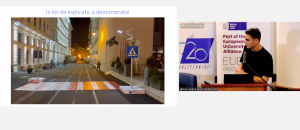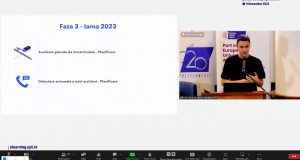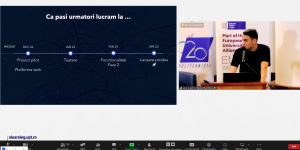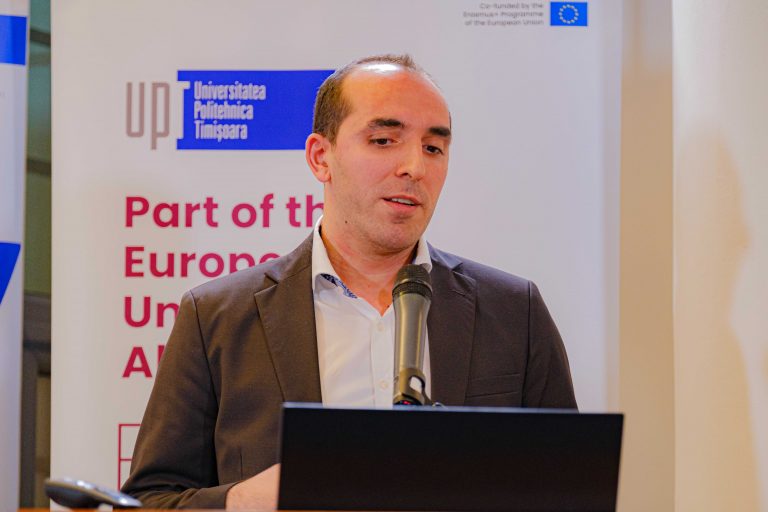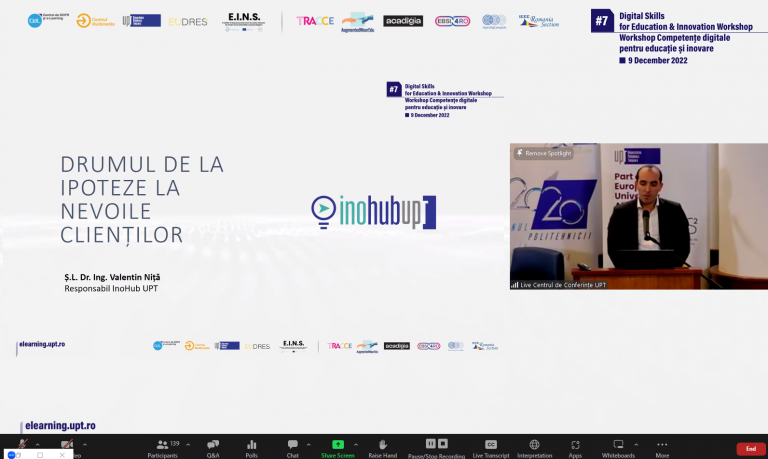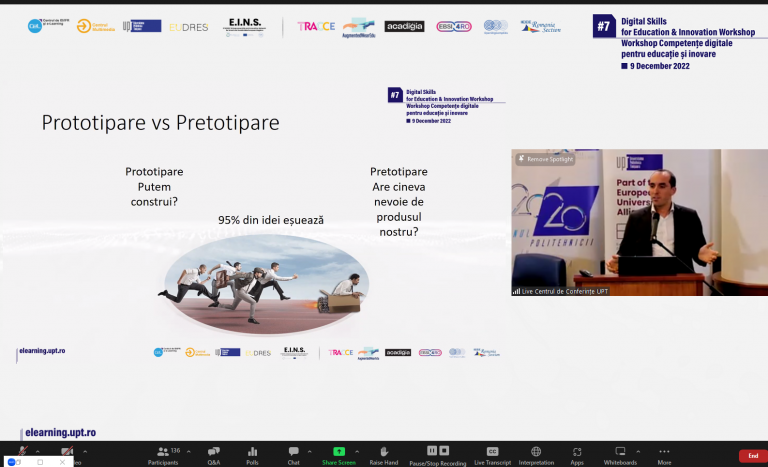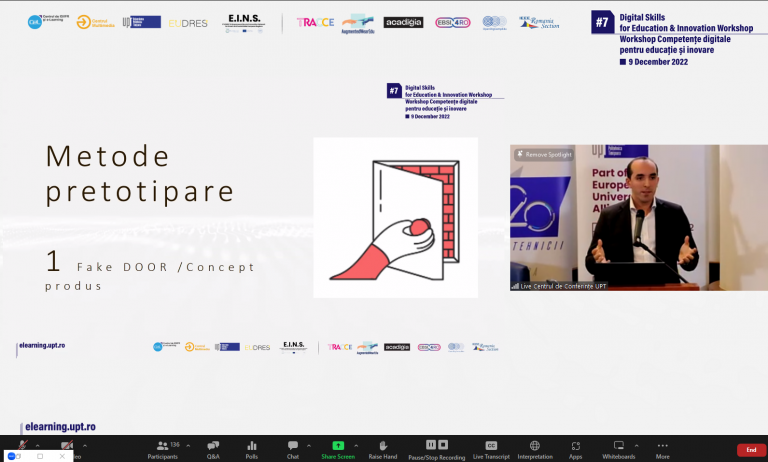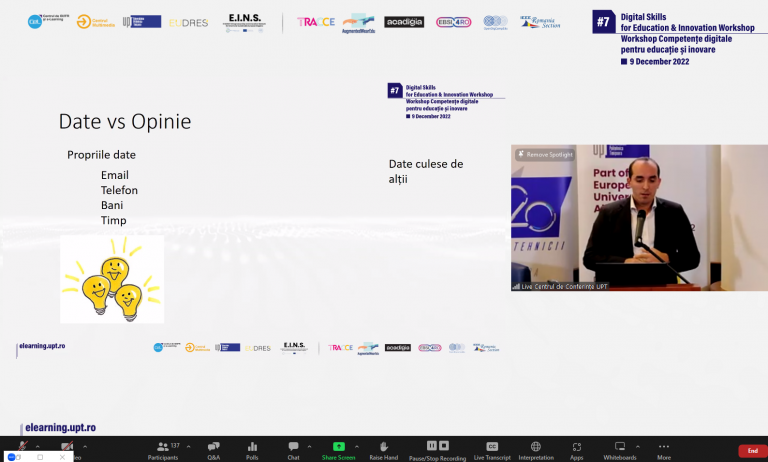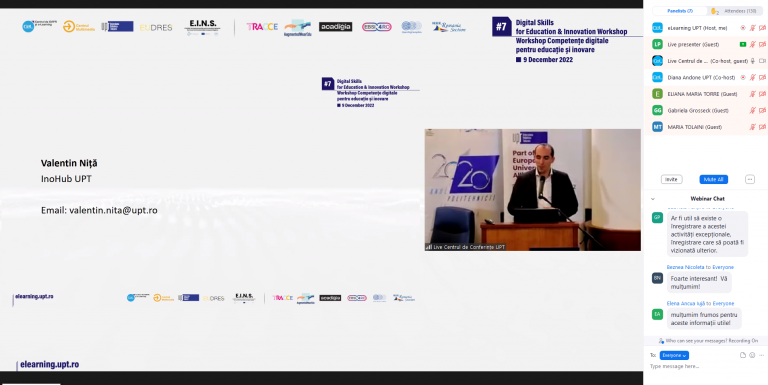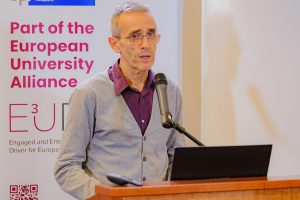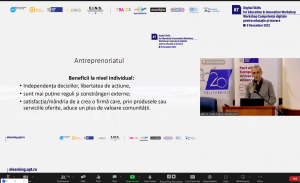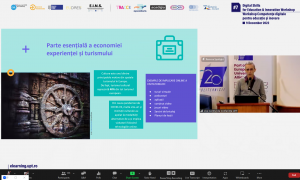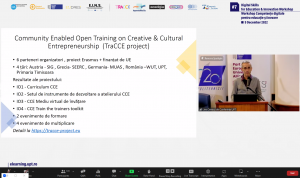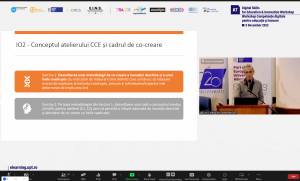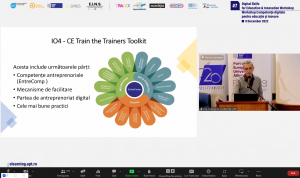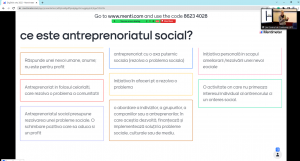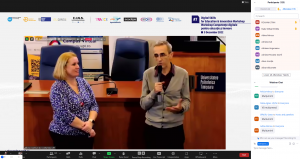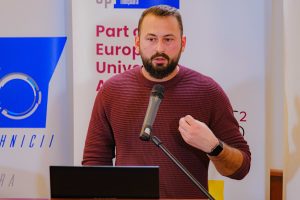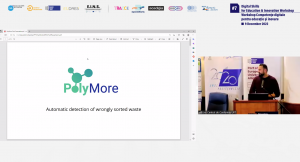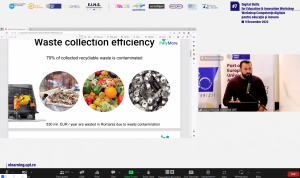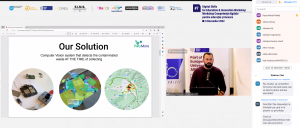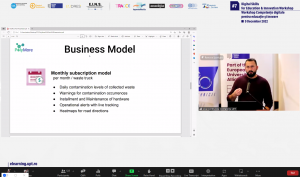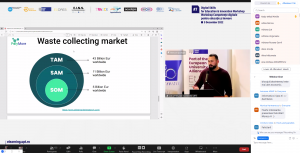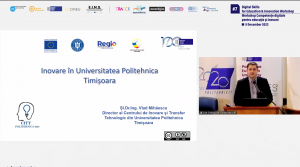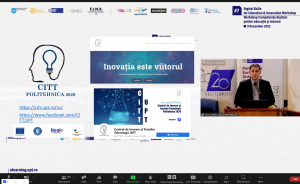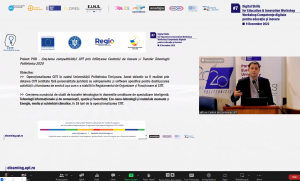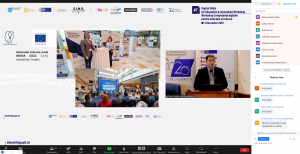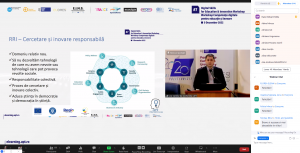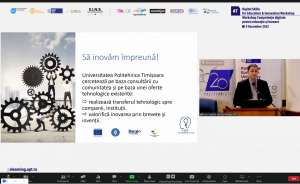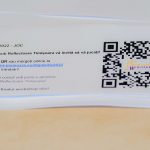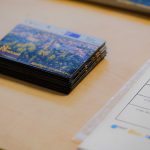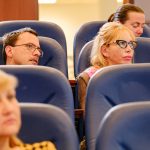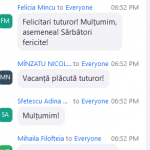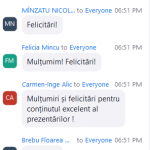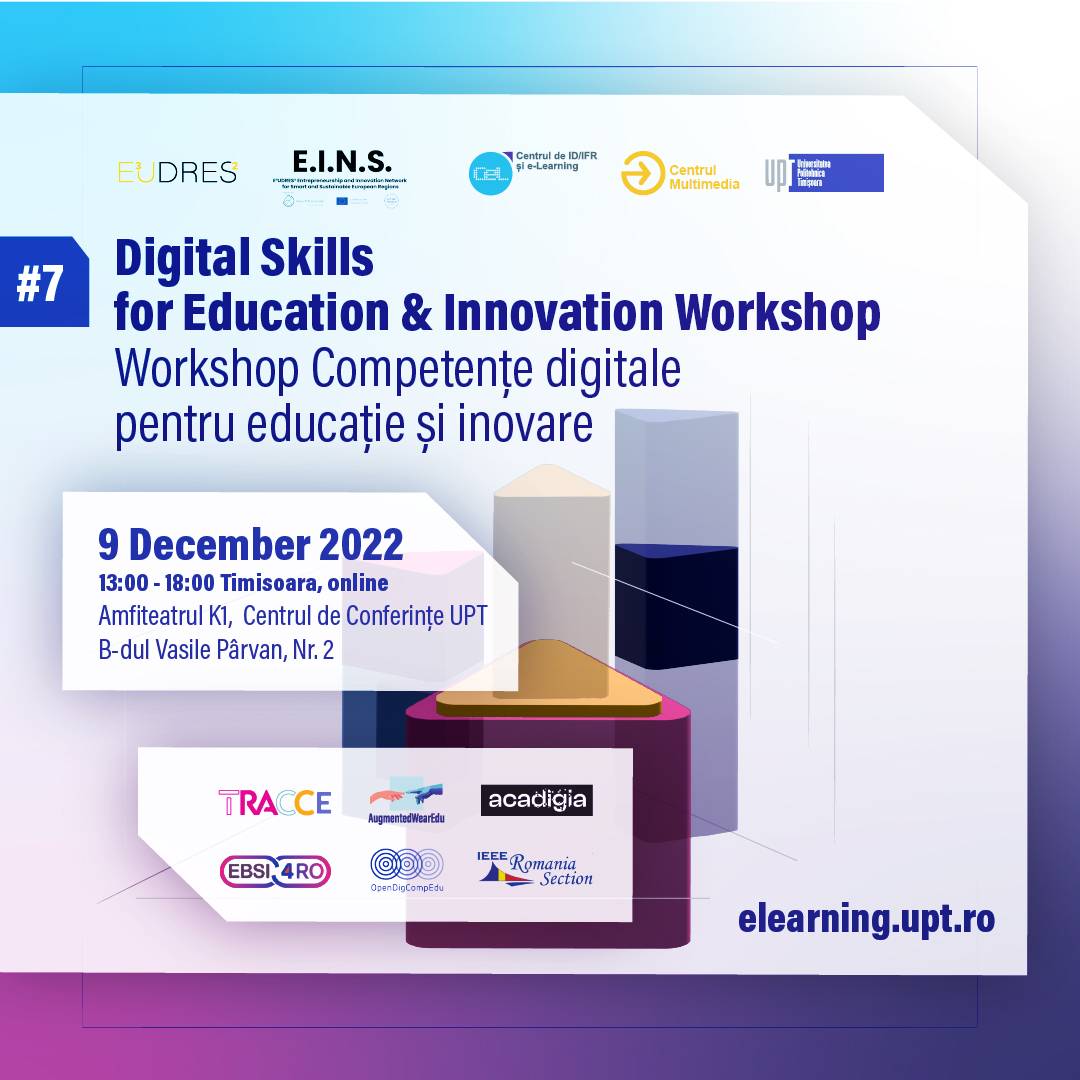
The seventh edition of the Digital Skills for Education & Innovation International Workshop
Hundreds of participants were together both online and physically on Friday, December 9, 2022, at the 7th edition of the international workshop dedicated to digital skills in education and innovation. The event was a real success, with 27 speakers, European experts, experienced teaching staff, as well as student entrepreneurs and people from the creative industries.
The Digital Skills for Education & Innovation was organized by ID/IFR and e-Learning Center and Multimedia Center – The Politehnica University of Timișoara, in collaboration with European University Alliance E³UDRES² and Entrepreneurship and Innovation Network for Smart and Sustainable European Regions EINS and IEEE Romania Association.
The presentations of successful actions in the field of education and innovation, the future education and innovation plans provided by universities, schools and companies, as well as various concepts on Digital Competences, Open science, Digital Entrepreneurship, Augmented/Virtual/Extended Reality, Experimental Media, Blockchain but also presentations of some startups supported by UPT, were the points of interest of this workshop.
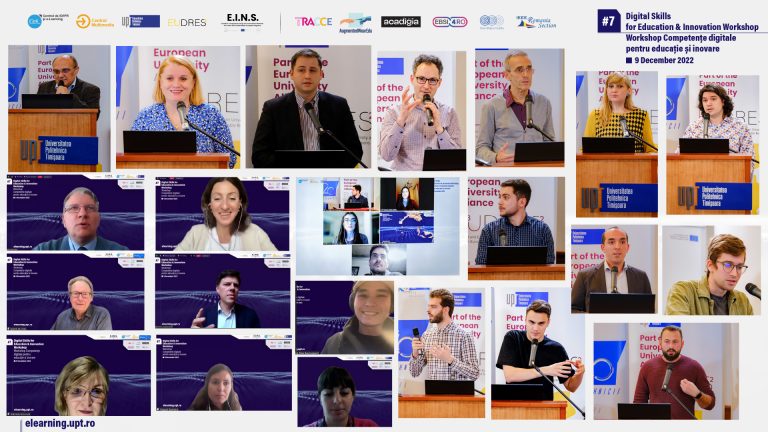
This year's edition focused in particular on the creation of communities that support the same values, on supporting them in the development of skills in the field of education and innovation, but also on the role of European Universities, especially in the context of projects supported by the partnership E³UDRES² and EINS
Practical examples of the use and integration of digital elements, virtual and augmented reality (AR & VR & XR) applications in medicine, education and in the promotion of cultural heritage and creative industries were another point of great interest of this event.
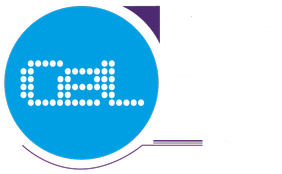
Projects of major interest for the European community
The workshop also included case studies about the impact that digitization has on education and culture, with examples from Timișoara but also from Europe, as well as about the initiatives and projects that can shape the education of the future.
Among the examples of good practice offered are the projects Traace, Augwearedu, Acadigia, OpenDigCompEdu and EBSI4RO – Connecting Romania through Blockchain, E³UDRES² and EINS and the culture and digital heritage project, Heritage under spotlights / Spotlight Heritage Timisoara.

Top presenters and topics of current interest
The event was opened by Prof.dr.ing. Radu Vasiu, President of the Senate Politehnica University Timișoara, Romania. Among the guests who honored the event with their presence at the opening was also Prof. Cristian-Gyozo Haba, IEEE Education Romania Chapter Chair, who shared the experience gained over the years of activity in the field of education and technology and spoke about the impact that European universities have in the field of innovation and education.
Prof.dr.ing. Radu Vasiu continued with a presentation on university actions for a smart and innovative region, talking about the revolutionary initiatives of the European University Alliance E³UDRES² and the Entrepreneurship and Innovation Network E³UDRES² for smart and sustainable European regions EINS
The initiatives are based on actions to co-create new ways for entrepreneurial universities to stimulate and develop entrepreneurial education, but also on advanced support for innovation. The President of the UPT Senate also spoke about the business accelerator projects, implemented by the Politehnica University of Timișoara especially for students, to improve knowledge beyond the current state, in areas such as IT, creative industries, tourism, health, energy.
Prog. Eng. Radu Vasiu ended the presentation with an interactive exercise, through which he found out what are the most important activities of the European Universities project E³UDRES² for the present audience.
Ilona Buchem, Professor for Communication & Media Sciences, Beuth University of Applied Sciences, Berlin, Germany spoke about the perspectives and results from a virtual exchange program, carried out during the summer term 2022 with university professors and students from three universities in Germany, Israel and the USA. The goal of the virtual exchange was to bring students together to collaborate in international teams, learn from each other, and give each other feedback in social robot learning experiences.
The Ent-re-no-va-tors project and its impact in universities was presented by Dr. Raquel Barreira from the Polytechnic Institute of Setubal, Portugal. Raquel continued the presentation with a question to the participants related to digital innovation and citizen engagement during the research process.
Thomas Jorgensen, Director of Policy Coordination and Foresight, European Universities Association gave an online presentation on institutional transformation in a changing legal context. The question "Are universities trailblazers or rule takers?" was the basis of the theme discussed in this presentation.
He spoke about the role of universities in strengthening regional innovation ecosystems Asst. Prof. Dr. Sjoerd de Vries from the University of Twente, the Netherlands, EIT HEI Prometheus. The presentation focused on the project Prometheus, which proposes the development of a common ecosystem with the local communities between the 8 partners and the 31 associated partners of the project. The main objectives of these communities are to strengthen relationships, collaborative innovation, develop entrepreneurship and strengthen and facilitate lifelong learning.
Dr. Diana Andone, Director of the UPT e-Learning Center, then took the floor, presenting the numerous actions for the digital transformation of universities and the vision for the development ofdigital competences for education and innovation among teaching staff, students, as well as for UPT collaborators, through the initiatives and projects carried out by the Politehnica University of Timișoara. The director of CeL presented various practical examples of the use and integration of digital elements, augmented and mixed virtual reality applications in education and culture, focusing on ways to attractively promote museums, exact sciences and arts among young people, with the help of robotics, AR, VR and MR applications from the USA, Europe and Timisoara.
In addition to the many resources offered, the director of CeL mentioned as examples of good practices:
- the European University Alliances project, which supports higher education innovation, with a focus on open learning and how the alliance E³UDRES² influenced partner higher education institutions
- the project E³UDRES² Entrepreneurship and Innovation Network for Smart and Sustainable European Regions EINS. and the actions that take place within the partner universities for the development of entrepreneurial education and business creation
- the Erasmus + Strategic Partnership project OpenDigCompEdu and the trainings developed for open digital skills for school educators
- the project TalkTech and the achievements that resulted from the 12-year collaboration between Romanian and American students, but also the digital tools that allowed these collaborations and their efficiency
- the project Heritage under the spotlight Timisoara, which uses concepts such as digital heritage, integrated into web and mobile applications and cultural engagement of communities
- the project Erasmus+ DigiCulture – "Improving Digital Skills and Improving the Social Inclusion of Adults in the Creative Industries” and the free online courses developed within the project
Prof.dr.eng. Carmen Holotescu from the Ioan Slavici University Timisoara, Romania spoke to the participants about the mini MOOCs available on the platform Unicampus.ro, about Blockchain.
Carmen gave an overview of the European Infrastructure of Blockchain Services, bringing the project to the attention of the participants EBSI4RO: Connecting Romania through Blockchain, in which UPT is partnering with UEFISCDI, which addresses the European strategy by issuing micro-credentials on the Blockchain and by offering massive open online courses (MOOCs) structured as micro-credentials.
Dr. Eng. Victor Holotescu from the Politehnica University of Timișoara, Romania, continued with a presentation related to EBSI, bringing to the attention of the participants numerous examples of use cases in issuing Verifiable Credentials on EBSI by The Politehnica University of Timișoara.
The project Spotlight Heritage Timișoara, with actions from 2022 in the promotion of Timisoara on a large scale were presented by Prof. Dr. Eng. Silviu Vert from the Politehnica University of Timișoara.
His presentation was followed by VR&AR&MR demonstrations in the Spotlight Heritage project by international student teams, winners of the ISHCH 2022 competition.
Marius-Cosmin Tataru, Sorina Zorita Gavriliuc-Voina, Radu-Dorian Stamatoiu, PhD students at the Politehnica University of Timișoara, Romania, together with Giulia Innocentini, master student and Eliana Maria Torre, PhD student, Università di Modena and Reggio Emilia, Italy and Peter Guld Leth, Oskar Bill Zhou, master's students at the University of Aalborg, Denmark, presented the app they developed to the participants, Explore Timisoara in VR, through which you can discover the local heritage.
application Timisoara quest in XR was presented by Silviu Berzescu, master's student at the Politehnica University of Timișoara, Maria Tolaini, master's student at the Università di Modena and Reggio Emilia, Italy and Mikkel Sang Mee Baunsgaard, master student at Aalborg University, Denmark. The students talked about the experience they had during the development of this virtual environment, where users can interact and learn more about objects from the heritage of the National Museum of Banat, all the content of the application being superimposed on reality.
I would. university Dr. Pop Valentine, specialist doctor, Victor Babeș University of Medicine and Pharmacy in Timișoara, brought to the participants models of medical applications developed with the help of VR technology.
At the same time, Dr. Valetin Popa introduced the research and projects he coordinated in collaboration with the Victor Babeș University of Medicine and Pharmacy on the topic of medical simulation assisted by software and virtual reality.
Prof. Dr. Gabriela Grosseck, Western University of Timișoara, Romania spoke in his presentation about numerous innovative tools for education, emphasizing their importance during the pandemic period. At the same time, associate dr. Grosseck brought to the participants' attention the terms and conditions of use of these applications. The presentation was followed by a free discussion related to the question "What is my favorite tool, that number 1, that I can recommend and which one is the most suitable for my purposes? ".
Olariu Ioan-Robert, student at the Politehnica University of Timișoara, Romania and the founder of Blume Technologies, spoke to the participants about the innovation behind the start-up from Timișoara. This project aims to reduce the number of accidents on pedestrian crossings, using video cameras, artificial intelligence and a warning system with LEDs. Robert continued the presentation with the initiatives and next actions that will take place in the development of the Blume Technologies system.
Dr. Eng. Valentin Nice, teaching staff in the Politehnica University of Timișoara, spoke about student entrepreneurship and the actions that take place in the university through the Student Entrepreneurial Society InoHub UPT.
Valentin presented the structure that ensures the development of students' entrepreneurial skills, by organizing and facilitating access to events with entrepreneurial themes dedicated to them, bringing to the public's attention numerous examples of the actions and projects initiated by InoHub UPT, in which he was involved.
The workshop continued on the theme of entrepreneurship, this time focusing on social entrepreneurship in the creative industries. Dr. Mihai Lisetchi, Western University of Timișoara, Romania introduced the public to the topic by asking the question "What is social entrepreneurship?”, then presenting the European Union's vision on the Cultural and Creative Industries and the essential parts of this field, with numerous practical examples.
The project TraCCE – Training on Creative & Cultural Entrepreneurship was presented as an example of good practice in this workshop. Mihai spoke about the concept of the project and the latest news regarding open courses and training activities for the cultural and creative community, developed by TraCCE partners.
Christian Pogan, graduate of Politehnica Timișoara University and co-founder of PolyMore, had a presentation about PolyMore and the innovative side of the start-up, whereby recycling companies are able to automatically identify and locate households where waste is missorted.
Dr. eng. Vlad Mihăescu, the Director of the Center for Innovation and Technology Transfer from the Politehnica University of Timișoara, Romania, spoke to the participants about innovation at the Politehnica University of Timișoara, reviewing the many actions that take place within IATTC – the department that has the competence to implement the strategies and policies of the university in the field of education, research, development and innovation from the perspective of technological transfer, in accordance with the dynamics of the national strategy of the Ministry of National Education.
During the presentation, Dr. Vlad Mihăescu announced the innovation and invention competitions and fairs that the CITT team participated in this year, both in the country and abroad, which managed to bring a record number of awards to the UPT .
Moreover, the director of CITT UPT brought to the public's attention the steps for RRI responsible research and innovation, concluding the presentation with an exhortation addressed to the participants, regarding collaborative innovation: "Let's innovate together!".
The event took place both physically, in the Conference Center of Politehnica Timișoara University, and online, being broadcast simultaneously on the Zoom and Facebook platforms. The marathon of better than 6 hours of presentations collected numerous questions and curiosities addressed to the presenters, dozens of messages and thoughts sent to the organizers and an audience of over 400 participants, present either online or physically.
For more interactivity with the participants, the presenters created creative questions on the Menti platform, which were broadcast live during the presentations, and the answers were to be discussed and interpreted by specialists.
All workshops are integrated, with activities and tests in the UPT free online course platform – UniCampus and can be followed by anyone, at the end being awarded a certificate of graduation.
Having reached its seventh edition, the international workshop dedicated to digital skills gathered over 6,000 participants since the first edition in 2016, being organized annually, in November or December. Except for the years 2020 and 2021, when the two editions of this workshop took place completely online, all other editions took place hybridly, which allowed participants to be present as they preferred, gathering a large audience from all corners of the world and a record number of presenters.
E³UDRES² – Engaged and Entrepreneurial European University as Driver for European Smart and Sustainable Regions, European University Alliance promote the development of small and medium-sized cities (being located in such cities themselves) and their rural environments into smart and sustainable regions. Trying to shape a prosperous future with the best possible quality of life for self-determined people in a progressive European society is the base of their work done on this topic of E³UDRES². Entrepreneurship and Innovation Network for Smart and Sustainable European Regions EINS co-ideates novel pathways for entrepreneurial universities, drives the development of entrepreneurial education, co-creates advanced support for innovation and business creation, and enhances collaboration across the knowledge triangle beyond the state of the art.
Education Romania Chapter. encourages and supports activities to promote engineering through a variety of actions, support materials created and shared among IEEE colleagues, conferences where studies from educational experiences are presented, seminars and webinars to inspire best practices.
Watch the full event recording below:
